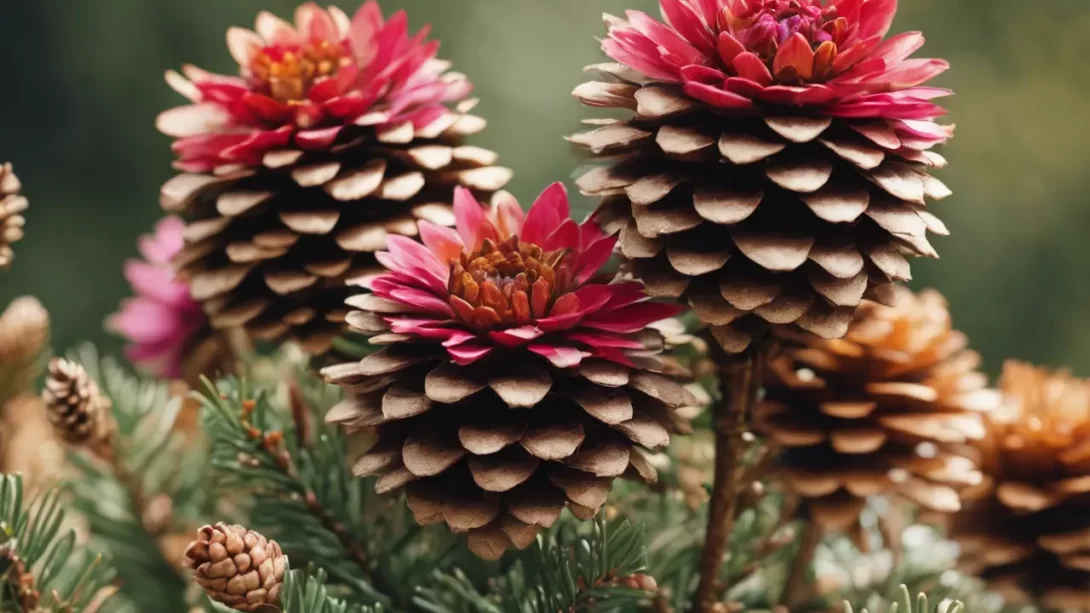Pine cone flowers are a delightful and unique craft that brings a touch of nature’s charm into your home. They are versatile, fitting beautifully into various decor styles, from rustic to contemporary. Plus, they are an eco-friendly DIY project that can be a fun activity for crafters of all ages. In this article, we’ll guide you through the process of transforming ordinary pine cones into stunning floral displays, perfect for home decoration, gifts, or as a nature-inspired craft project.
Gathering Materials
To begin, you’ll need a few basic materials:
- Pine Cones: Look for a variety of sizes and shapes to create diverse flower styles.
- Paint: Acrylic paint works well for its bright colors and quick drying time.
- Paintbrushes: Different sizes for detailed painting.
- Wooden Dowels: These will serve as stems for your pine cone flowers.
- Hot Glue Gun: For attaching the dowels to the pine cones.
- Optional Decorations: Consider glitter, beads, or small ornaments for added flair.
When selecting pine cones, choose ones that are fully opened and free from mold or excessive sap. This ensures your pine cone flowers will have a pleasing, open appearance and be easier to work with.
Preparing the Pine Cones
Before you start crafting, it’s important to prepare the pine cones properly:
- Cleaning: Gently brush off any dirt or debris. If they are sticky, a little hand sanitizer can help remove sap.
- Drying: Lay the pine cones out to dry completely if they are damp. This can take a day or two depending on humidity levels.
- Baking (Optional): For a thorough clean and to remove any bugs, bake the pine cones in the oven at a low temperature (around 200°F) for about 30 minutes. Monitor them closely to avoid scorching.
Always handle pine cones carefully, as the edges can be sharp. Wearing gloves during preparation can protect your hands from sap and prickles.
Painting the Pine Cones
Now comes the creative part – painting your pine cones to look like flowers:
- Color Selection: Choose colors based on the type of flower you want to mimic, or get creative with your own color schemes.
- Painting Techniques:
- For a realistic look, study images of real flowers and mimic their color patterns.
- Apply a base coat and then add details like gradients or speckles to bring your pine cone flowers to life.
- Experiment with brush strokes – use fine brushes for details and larger brushes for broader color areas.
Remember, acrylic paint dries quickly, so have a plan before you start. It’s also a good idea to paint a few test pine cones to refine your technique.
Assembling the Flowers
Once your painted pine cones are dry, it’s time to turn them into flowers:
- Attaching Stems: Cut the wooden dowels to your desired length for stems. Using a hot glue gun, attach one end of a dowel to the base of a pine cone. Hold it in place until the glue sets.
- Strengthening the Bond: For added durability, you can apply a second layer of glue around the joint where the dowel meets the pine cone.
- Creating a Bouquet: Group various sizes and colors of pine cone flowers together to create an eye-catching bouquet. Balance is key – mix colors, sizes, and heights for a natural look.
Creative Variations
There’s no limit to how creative you can get with pine cone flowers:
- Different Flower Types: Mimic different flowers by altering your painting technique. For instance, long, sweeping brush strokes can create a petal-like effect for a rose, while dabbing with a sponge brush can mimic a daisy’s texture.
- Using Pine Cone Parts: Don’t hesitate to break apart pine cones and use individual scales as petals for smaller, more intricate flowers.
- Seasonal Variations: Adapt your color palette to the season – warm oranges and yellows for fall, pastels for spring, or icy blues and whites for winter.
Uses and Display Ideas
Pine cone flowers can enhance your home in many ways:
- Vase Displays: Place your pine cone flower bouquet in a vase for a permanent centerpiece. Consider filling the vase with stones or sand for additional support and aesthetic appeal.
- Wreaths and Wall Hangings: Incorporate pine cone flowers into wreaths or wall hangings. They add texture and a natural element to these decorations.
- Event Decor: Use pine cone flowers for rustic-themed weddings or parties. They can be part of table centerpieces, place setting decorations, or even bouquets.
Conclusion
Pine cone flowers are a unique and creative way to bring a touch of nature into your home or events. This project not only offers a fun and engaging craft experience but also results in beautiful, eco-friendly decorations that can be tailored to fit any style or occasion. Whether you’re looking to spruce up your living space, add a rustic touch to a special event, or simply enjoy a relaxing craft, pine cone flowers are a perfect choice.
Experimentation and Personalization
The beauty of this project lies in its versatility and the room for personal creativity. Feel free to experiment with different painting techniques, color schemes, and arrangements. Each pine cone flower you create will be unique, reflecting your personal style and artistic touch.
Sharing Your Creations
We would love to see how your pine cone flowers turn out! Share your creations, experiences, and any additional tips you’ve discovered in the comments below. Your insights and designs could inspire others and contribute to the community of nature craft enthusiasts.
Eco-Friendly and Sustainable Crafting
By using materials from nature and upcycled items, you’re contributing to a more sustainable and environmentally friendly approach to crafting. Pine cone flowers are not only beautiful but also a testament to the endless possibilities of nature-inspired art.
Final Thoughts
Whether you’re a seasoned crafter or trying this for the first time, we hope you find joy and satisfaction in creating pine cone flowers. This simple yet delightful project is a testament to the beauty that can be found in nature and the endless creativity it can inspire.



